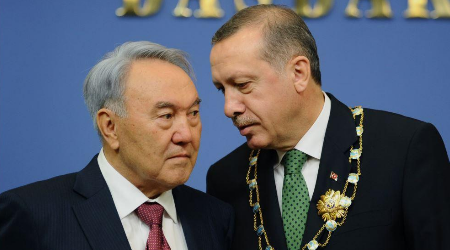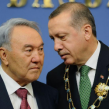
Hard Choice for Kazakhstan as Russia-Turkey Spat Deepens
Publication: Eurasia Daily Monitor Volume: 12 Issue: 218
By:

On November 28, Russian President Vladimir Putin declared economic sanctions against Turkey. Four days earlier, the latter had downed a Russian Su-24 fighter jet near the border with Syria after it illegally entered Turkish airspace, according to both Ankara and the North Atlantic Treaty Organization (NATO). The sanctions package prohibits the employment of Turkish citizens starting in January 2016, discontinues visa-free travel to Russia, and bans the import of certain foods from Turkey. Despite recent signs of a limited rapprochement with the West over the common fight against the Islamic State extremist group in Syria, Russian-Western relations remain deadlocked. In particular, the two sides are still at loggerheads over the Kremlin’s support to the regime of Syrian President Bashar al-Assad and Russia’s interference in Ukraine’s domestic affairs (Mk.ru, Vedomosti.ru, November 28, Rbc.ru, RIA Novosti, December 1).
Together with the Russian-Western tensions over Russia’s annexation of Crimea last year, the latest spat between Moscow and Ankara is a challenge for Kazakhstan. The Central Asian country is a member of the Russia-led Eurasian Economic Union (EEU), which also includes Belarus, Armenia and Kyrgyzstan, and of the Collective Security Treaty Organization (CSTO). In January–September 2015, Russian-Kazakhstani trade turnover amounted to more than $11.1 billion, thus making Russia Kazakhstan’s largest trade partner, despite being stricken by a recession due to the low price of oil. China is in second place, with $8.3 billion. This figure actually represents a contraction from $13.3 billion the year before, largely due to China’s reduced demand for Kazakhstan’s oil, steel, copper, and other commodities (Stat.gov.kz, December 2; Kursiv.kz, October 13).
As for Turkey, it ranks seventh after Russia, China and four European countries—the Netherlands, France, Switzerland, and Germany, with approximately $1.7 billion worth of goods and services traded during the first nine months of 2015. Between 2005 and Q1 2015, Turkish businesses invested in excess of $1.8 billion in the Kazakhstani economy and are currently widely represented in construction, retail commerce, the processing industry and pharmaceuticals. Moreover, there are about 1,500 legal entities with Turkish capital that are registered with Kazakhstan’s Ministry of Justice—fewer only than the number of Russian firms legally operating in Kazakhstan. In the early 2000s, Turkish construction companies took an active part in the establishment of a brand-new administrative and political center in the capital Astana, which President Nursultan Nazarbayev moved from Almaty in 1998 (Kapital.kz, October 1; Mfa.gov.kz, April 12; Inform.kz, March 4).
Yet, Turkey is far more important for the Nazarbayev administration from a geopolitical perspective. Ankara was actually the first capital to recognize Kazakhstan’s independence and had been particularly proactive in fostering closer ties to Central Asia since the early 1990s. Today, Turkey is a key pillar of Nazarbayev’s multi-vector foreign policy, alongside the Russia-focused Eurasian integration, strategic partnerships with China and the West, and overtures to new frontiers such as the Persian Gulf and Southeast Asia. The cordial relationship between Nazarbayev and Turkish President Recep Tayyip Erdoğan, who was previously prime minister, in 2003–2014, resulted in 2009 in the creation of the so-called Turkic Council of which Azerbaijan and Kyrgyzstan are the two other members. Furthermore, Kazakhstan had, until recently, supported a free trade zone between Turkey and the EEU (Kt.kz, April 16; Inform.kz, December 16, 2013; Caravan.kz, October 24, 2009).
The Su-24 incident and the ensuing deterioration of the heretofore rather successful cooperation between Putin’s and Erdogan’s governments have put Kazakhstan in a difficult situation. The ambiguity of its stance became fully clear on the same day the military plane was shot down, when the chair of the Kazakhstani Senate, Kassym-Zhomart Tokayev, wrote on his Twitter account: “The unjustified downing of a Russian bomber by the Turkish air force is a serious incident that will have heavy consequences for bilateral relations.” This comment by the country’s most famous diplomat—who was the public face of its diplomacy in 1994–1999 and again in 2002–2007, and later headed the United Nations Office in Geneva from 2011 to 2013—was interpreted by many as a pro-Russian choice (Newskaz.ru, RIA Novosti, November 24).
However, the import of Tokayev’s statement was promptly toned down by the foreign ministry itself, which, on November 25, called on both sides to “show restraint in reacting to this tragic event and to use all means and communication channels at their disposal to de-escalate the situation.” In his annual “State of the Union” address of November 30, Nazarbayev himself gave an assessment of the Turkish-Russian predicament, albeit with a veiled defense of Russia. “Not all the nuances are clear yet, but the fact is that the Russian jet did not want to attack Turkey. It was about to attack the terrorists. As friends and allies in the fight against terrorism, Russia and Turkey ought to find common language and not spoil their relations, which it has taken so long to build,” he said (Akorda.kz, November 30; Tengrinews.kz, November 25).
While the Kazakhstani authorities are struggling to formulate a coherent message that refrains from offending either side, the local expert community deems it crucial for Astana to maintain its neutrality. Thus, Almaty-based political scientist Dossym Satpayev has told Azerbaijani media that it is important not to “become a side to the argument.” Both Kazakhstan and Azerbaijan have already expressed an interest in carrying out mediation—so far to no avail (Vz.ru, December 2; Haqqin.az, November 27). It goes without saying that Astana stands to lose from the Russian-Turkish quarrel. However the situation unfolds, Kazakhstan’s government is most likely to stick to the tenets of its multi-vector foreign policy. In the worst-case scenario, which is practically impossible absent a real war, Ankara could close the Turkish Straits to Russian vessels going from the Black Sea out to the Mediterranean. This is the way most Kazakh oil is exported to the world market—so for Nazarbayev and his government, peace is non-negotiable.




